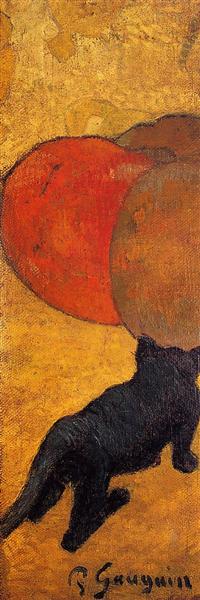Tanım
Paul Gauguin's painting "A Little Kitten" (1888) is a work that encapsulates the artist's aesthetic sensibility and his innovative approach towards the use of colour and form. This work, though seemingly simple in its subject matter, reveals significant depths in the context of post-impressionism and the emotional exploration that characterise Gauguin's artistic journey.
Looking at “A Little Cat,” we are greeted by the image of a small feline lying in a relaxed position, in a sort of silent contemplation. The composition is notable for its visual harmony, where the cat’s silhouette is clearly defined and stands out in the painting. The choice of an earthy color palette, dominated by shades of yellow, brown and green, reflects Gauguin’s penchant for flat colors and subtle contrasts, moving away from the nuances and light effects of the classical Impressionism of which he had been a part.
The use of color in this work is a focal point that deserves attention. Gauguin employs colors that not only represent reality, but also invoke emotions and sensations. In “A Little Cat,” the background is rendered with a rich and vibrant texture that envelops the subject in an aura of calm and serenity. The proportion of warm colors in the cat effectively contrasts with the more subdued background, allowing the figure of the cat to become the visual center of the piece. This expressive use of color aligns with his interest in symbolism, where every nuance can be interpreted as an extension of the artist’s feelings.
The lack of human characters in this work opens up space for introspection and contemplation. Through the cat, Gauguin may be exploring themes of solitude, intimacy and connection with nature. Cats are often a symbol of independence in culture and in this sense, the cat in A Little Cat could be seen as a reflection of Gauguin's own personal philosophy, a man who also sought a life away from the social conventions of his time.
In terms of style, A Little Cat fits into the evolution of Post-Impressionism, where artists such as Gauguin sought ways to express their personal vision of the world through the simplification of forms and the exploration of non-naturalistic colors. The work reflects influences ranging from Japanese painting, evident in the delicacy of contour and compositionality, to the heritage of Impressionism, from which Gauguin gradually moved away as he developed his own artistic voice.
In conclusion, “A Little Cat” is not just a depiction of a domestic animal, but a profound exercise in aesthetics that invites contemplation and self-knowledge. The work is a testament to Gauguin’s care for form and color, and his ability to evoke an emotional response through simplicity. This painting, although small in scale, occupies a significant place within the legacy of its author and within the history of art. The work invites the viewer not only to see, but to reflect on the relationship between humanity and the animal world, as well as to experience the beauty of artistic representation in its purest form.
KUADROS ©, a famous painting on your wall.
Hand-made oil painting reproductions, with the quality of professional artists and the distinctive seal of KUADROS ©.
Painting reproduction service with satisfaction guarantee. If you are not completely satisfied with the replica of your painting, we will refund 100% of your money.

